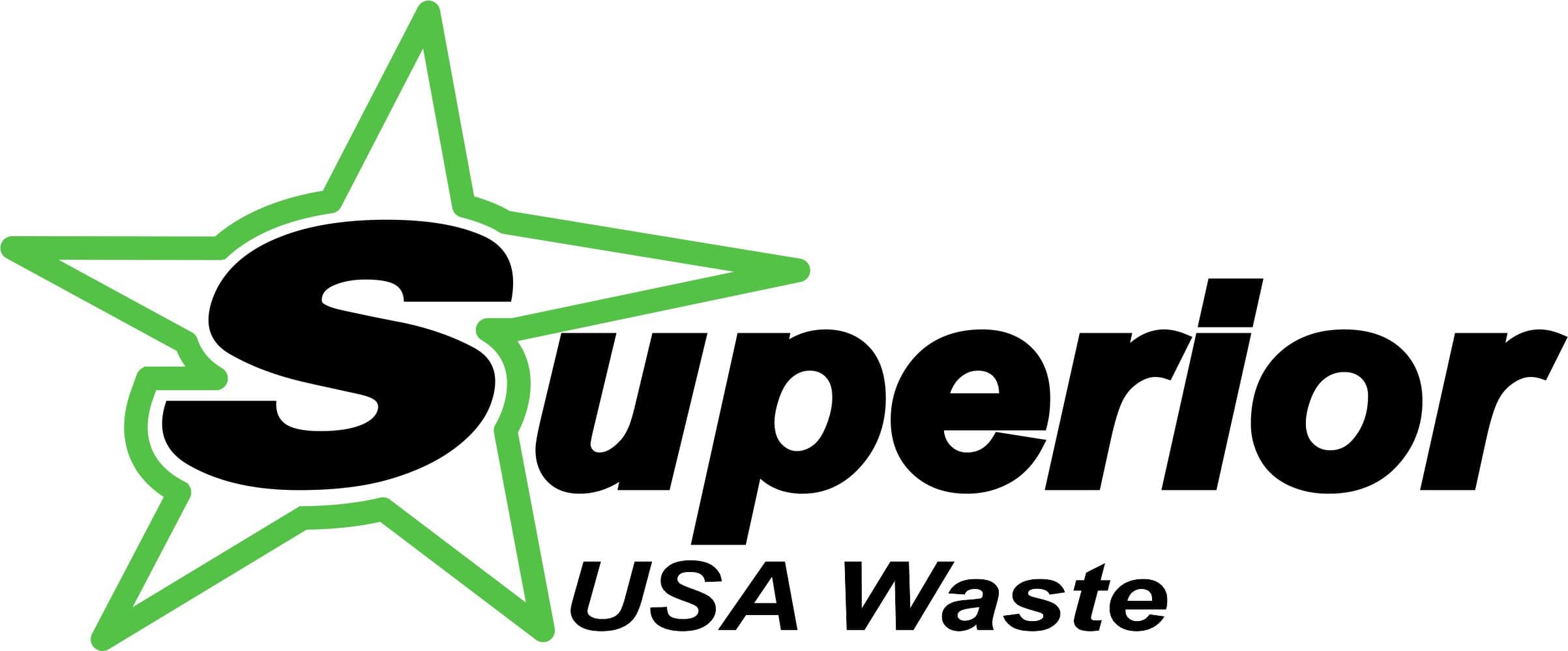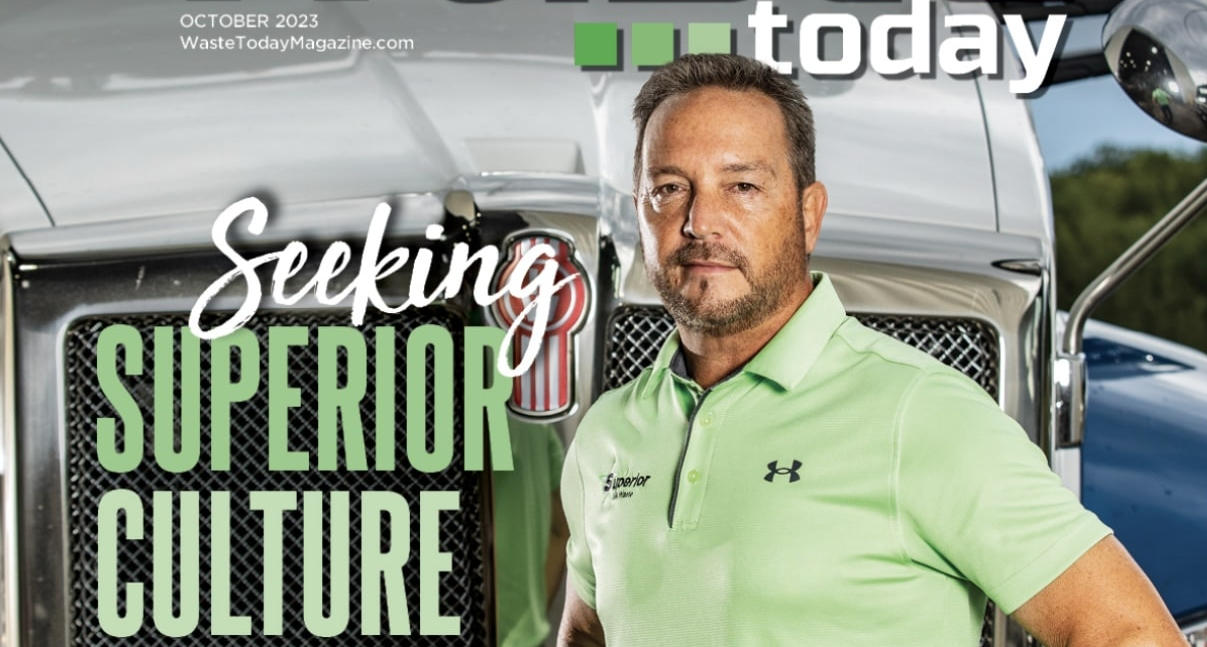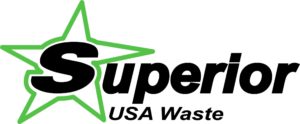Billy Dietrich, CEO of Shawnee, Oklahoma-based Superior USA Waste Industries, grew up on the back of a trash truck.
“I started on the back of a truck [at] a summer job in 1988,” he says. “My father thought that was the best way for me to learn the business. I certainly didn’t agree with him at the time. I 100 percent agree with him now.”
He says that experience gave him a perspective that he has carried with him ever since—an appreciation for the hard work employees do in the field and the importance of making them as comfortable as possible.
After spending several decades working in the industry with a variety of companies, Dietrich founded Superior USA Waste LLC in 2021.
Before he formed his own company, he says he was able to learn a great deal from his father and from working at other companies in the industry, dating back to the summer of ’88 that he spent collecting waste.
Before joining West Allis, Wisconsin, Superior Services in the mid-’90s, the company his father, Bill, led, Dietrich says he worked in sales for Mid-American Waste Systems in Columbus, Ohio.
“When I started working at Mid-American, I wanted to do something on my own,” he adds. “I didn’t want to just jump into the Superior business; I wanted to get a better background, if you will, within the industry with Mid-American.”
After starting in the waste industry in the 1980s, in the early 1990s, Dietrich’s father was asked to lead Superior Services, which he says was formed by a conglomeration of about 22 waste industry entrepreneurs.
“[Superior Services] was brought together to compete against the Waste Managements and the BFIs of the world,” he says. “That business went from around $20 million when it initially started to a little over $300 million in revenue in … five years.”
When he joined Superior Services, Dietrich says he learned more about business development.
“I started doing municipal development and the acquisition and business development side, as well, and did several purchases in Ohio and West Virginia. … That kind of brought me into the operational side, as well as the general manager side,” he says.
Dietrich says Superior Services was sold to Vivendi, a France-based environmental services company, in 1999.
He and his father continued running Superior Services for another five years or so. During that time, he says, they moved the company’s headquarters to Sarasota, Florida, and were able to expand through municipal contracts and organic growth to about $100 million in revenue over 16 months.
After integrating Montenay Inc.—a waste-to-energy subsidiary of Vivendi with eight facilities in North America—into its portfolio and increasing annual revenue to $1.2 billion, Dietrich says he and his father realized they couldn’t expand the business the way they wanted to and agreed to a noncompete deal around 2005 and decided to “sit out and enjoy [their] families” for several years.
In 2008, Dietrich says he and his father bought Bobcat Disposal, a small portable toilet and roll-off business, and expanded that into the largest such business in the Sarasota area.
“We really enjoyed it,” he says. “It was the first time that I had really gotten into the portable toilet business.”
Separately, the Dietrichs took over operations at Deffenbaugh Industries, a Kansas City, Kansas-based hauling company, in 2010. Dietrich says they professionalized the culture and upgraded the equipment, eventually selling it to Houston-based WM Inc. (formerly Waste Management) in 2015.
Dietrich says he and his father continued running Bobcat Disposal and partnered with two private equity firms to buy another company, folding Bobcat into that firm. In 2018, he parted ways with his private equity partners and his father retired.
Striking out on his own
With around 30 years of experience in all aspects of the business, including many turnarounds and acquisitions, Dietrich started planning to form a new company.
Starting with his time on the back of a garbage truck to running Deffenbaugh, Dietrich had accumulated a wide range of experience that made him a well-rounded waste industry executive.
Dietrich says he was approached by many private equity firms about running businesses but was “fairly picky” about who he wanted to work with.
Ultimately, he says he met with Toby Chambers, a managing partner with Atlanta-based Red Dog Equity, to discuss his plans to start a new waste business.
“Toby and I spoke on the phone, and the first time we spoke for maybe an hour or hour-and-a-half,” Dietrich says.
Those talks resulted in the establishment of Superior USA Waste, a holding company built on the acquisitions of Central Disposal, Shawnee, Oklahoma, in April 2022 and Harley Hollan Cos., Tulsa, Oklahoma, in September 2022.
He says those two companies’ assets complement each other in a way that imitates the approach that Superior Services took in the 1990s.
“It was all about the hub-and-spoke approach,” Dietrich says. “Being able to recreate that process again … with Central and with Harley, with the transfer station and the holding company, just made all the sense in the world. And it just goes back to what has made us successful in the past. Being able to internalize the waste goes a long way.”
Now, the combined companies employ a little more than 100 people and operate 50 trucks.
Operating under their original names, Central Disposal runs the CenterPoint Landfill, a transfer station and hauling operations in Shawnee, while Harley Hollan manages a hauling operation, transfer station and construction and demolition material recovery facility (MRF) in Tulsa.
A novel approach to driver recruitment
Dietrich says the workforce at Superior USA Waste is stable, but drivers come and go as they do at most hauling companies.
When Superior has had trouble keeping enough drivers on the payroll, Dietrich says he’s had good luck recruiting school bus drivers.
“We’ve been very successful in getting bus drivers to become solid waste drivers, particularly on the automated side loaders (ASLs),” he says. “You’ll hear me talk sometimes about how [safety] compliance is nonnegotiable, and, quite frankly, who are you going to be able to find who has more safety experience than a school bus driver?”
Because school bus drivers also drive in neighborhoods and make frequent stops, Dietrich says the most challenging part of their training is learning to operate ASL arms.
A people business
While the company’s trucks, landfill, transfer stations and MRF work together logistically, Dietrich says he attributes the company’s success to the personalities of Superior USA Waste’s leaders and the culture within the company.
“This is truly a culture-based business,” he says. “And I wanted to bring back that Superior name and that Superior culture, if you will. Many people have reached out to me when they saw the name, and they were just so excited.”
Establishing strong relationships with Central Disposal founder Mike Adcock and Harley Hollan Cos. founder Harley Hollan was key to making those partnerships work, Dietrich says. And those relationships are about more than understanding their business philosophies, he adds.
“I want to know what makes our sellers and entrepreneurs tick on a personal level,” Dietrich says. “Harley Hollan—he’s a huge race car driver. He’s a very well-known dirt track driver, and I love listening to Harley talk about racing.”
Dietrich says he is “blessed” to have a good relationship with Chambers and Tom Connolly, the managing partners at Red Dog.
“They’re fantastic. These guys are our true partners in every sense of the word,” Dietrich says. “I feel very, very blessed to be able to work with them and really build the business that we’ve talked about.”
He says finding a good match in an acquisition is key to forming a successful partnership. His biggest challenge is finding the type of entrepreneurs who are willing to work with him.
“I think the most difficult challenge is dealing with the entrepreneurial aspects of the business that they’ve been running their way for so many years,” he says of Superior USA Waste’s acquisitions. “I think that was the biggest challenge: to make sure that we understand their needs and they understand our needs moving forward.”
Prior to the 1999 acquisition by Vivendi, Superior Services had about 3,000 employees and was a target of interest for many entities that Dietrich says might not have had the same intentions for those 3,000 employees as he and his father did.
“If we had sold to one of those public companies at the time, probably half of our employees would have been gone through synergistic values and operations. … We did not want to do that to our employees,” he says.
Now, more than 20 years later, Dietrich’s values have not changed, but he is on the other side of the transaction.
“At the end of the day, we’re looking for those entrepreneurs that want to stick around, want to be a part of developing and building that Superior regional company,” he says. “It’s just exciting to see everybody working together to build that culture,” he says.


